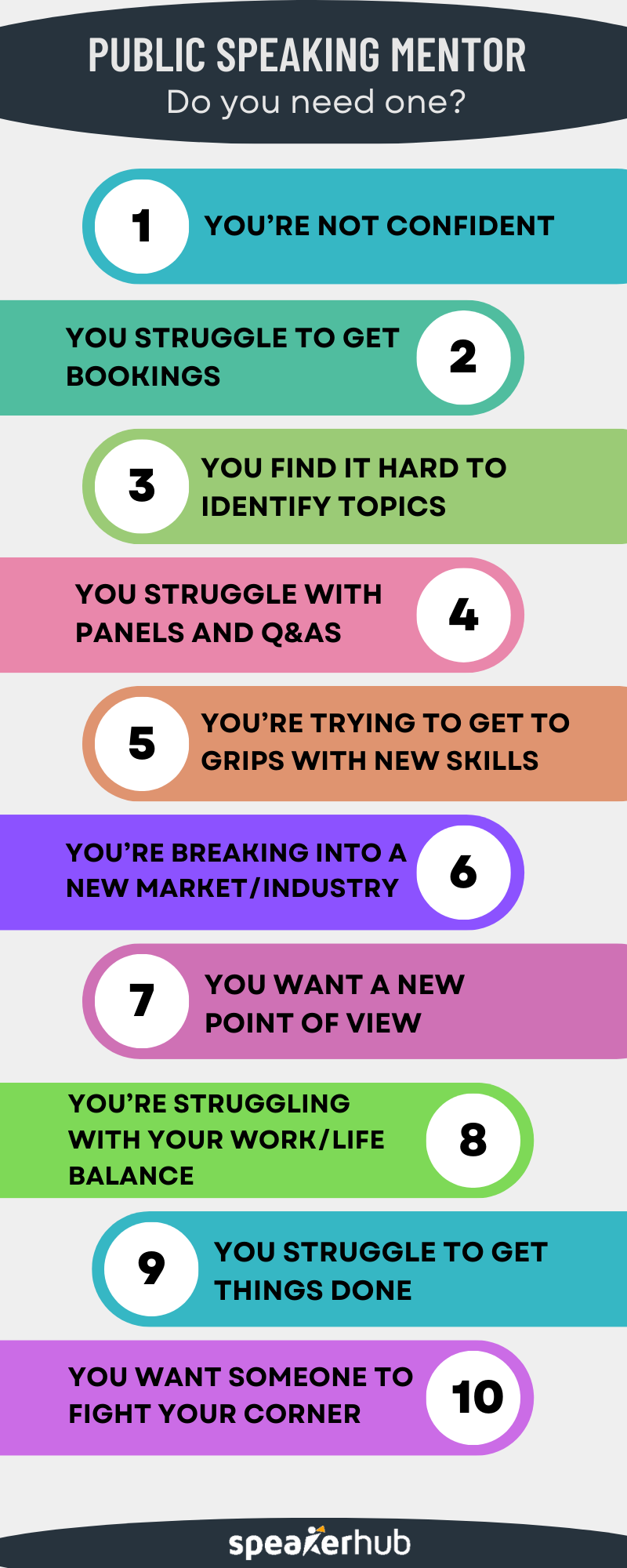Do You Need a Public Speaking Mentor?

These days, it seems like everyone has a mentor. We’re talking about everyone from junior art developers to successful entrepreneurs, and those who aren’t receiving mentorship can often be found providing mentorship to other people.
Mentorship is important in the public speaking industry too, which is where this week’s article comes in. We’re going to take a closer look at some of the benefits of taking on a mentor and share ten of the signs that might tell you that you need a public speaking mentor. Let’s get started.

1. You’re not confident
One of the most obvious reasons why you might need a public speaking mentor is if you’re struggling with confidence. After all, the fear of public speaking is the world’s most common phobia, ranking ahead of the fears of death, heights and spiders. If you’re struggling to overcome that lack of confidence, or it’s holding you back from giving your best at the events you’re booked to speak at, a mentor could help you to turn things around.
2. You struggle to get bookings
If you’ve been finding it difficult to get bookings, a mentor can help you figure out why that is and fix the problem. It could be that your messaging is off or you’re not quite communicating your USP. It could be that you don’t have the connections and you need a little help with some introductions. Whatever the case, a mentor can help you solve the problem and fix your business.
3. You find it hard to identify topics
It’s not uncommon to struggle to identify topics that you want to talk about. In some cases, that’s down to analysis paralysis – in other words, there are so many options that you find it difficult to settle on any one of them. It can also be because you’re working slightly outside your comfort zone and don’t know where best to focus. Whatever the case, a mentor can help.
4. You struggle with panels and Q&As
There are two types of public speaker – those who love taking part in panel discussions and Q&As, and those who hate it. If you fall into the latter category, you could benefit from finding a mentor who has a lot of experience when it comes to panel discussions and who can help to boost your confidence and ensure that you’re in the best possible place to take part in panel discussions.
5. You’re trying to get to grips with new skills
Mentorship is basically made for people who want to develop or implement new skills, because it enables you to find people who are experts at the skills that you’re trying to develop and to learn the ropes directly from them. So if you’re trying and failing to pick up a new skill, or even if you just want a shortcut to success and to be able to learn from the mistakes that others have made, rather than having to make those mistakes yourself, a mentor can help.
6. You’re breaking into a new market/industry
Mentors can be a great help if you’re trying to break into a new market or industry where they have expertise that pertains specifically to that industry. As with them helping you to pick up a new skill, they’ll know all of the dos and don’ts and will be able to share those insights with you to increase your chances of success. They might even be able to make introductions to help you with your networking.
7. You want a new point of view
Sometimes you have all the skills and experience that you need to get the job done, but you still think you could benefit from some external input. Mentors can be great for providing another point of view and a second pair of eyes to check over your presentations, and they can even share a point of view that you might not have considered before. That’s particularly likely to happen if they come from a different demographic or economic background.
8. You’re struggling with your work/life balance
If you’re struggling to balance your public speaking with your personal life, a mentor can help to get you back on track. There’s a pretty good chance that they’ve been in the same position themselves and they’ve been able to get through to the other side. So you’ll be able to ask them to take a look at what you’re doing and to share any tips they might have for better aligning your work life and your personal life.
9. You struggle to get things done
If you’re good with ideas but you occasionally struggle to execute, or even if you’re getting things done but you’re not quite being as productive as you’d have hoped for, a mentor can help by taking a look at what you’re doing and coming up with ways that you can streamline your workflow and squeeze more productivity into the same amount of time. You might just be surprised at how useful that can be.
10. You want someone to fight your corner
Find the right person and a mentor can be someone who’s going to fight your corner and stand by you throughout your career. So it can be a solid idea to find a mentor just so that you know that you’ve got that support. Even if you only check in with them a couple of times a year, it can do wonders for your self-confidence just to know that they’re there.
Conclusion
Now that you know our top tips for figuring out whether you need a public speaking mentor, you’re ready to decide whether finding one is the right move. The good news is that there’s no shortage of potential mentors out there, and most of them will be receptive if you reach out to them to chat about mentorship.
You’ve heard from us, and so now we want to hear from you. Have you got a public speaking mentor? And if so, how have you found the experience? As always, we’d love to hear your thoughts, so be sure to let us know in the comments so we can keep the discussion going. You can also follow us on your favorite social networking sites for more. We’ll see you soon for another article!






